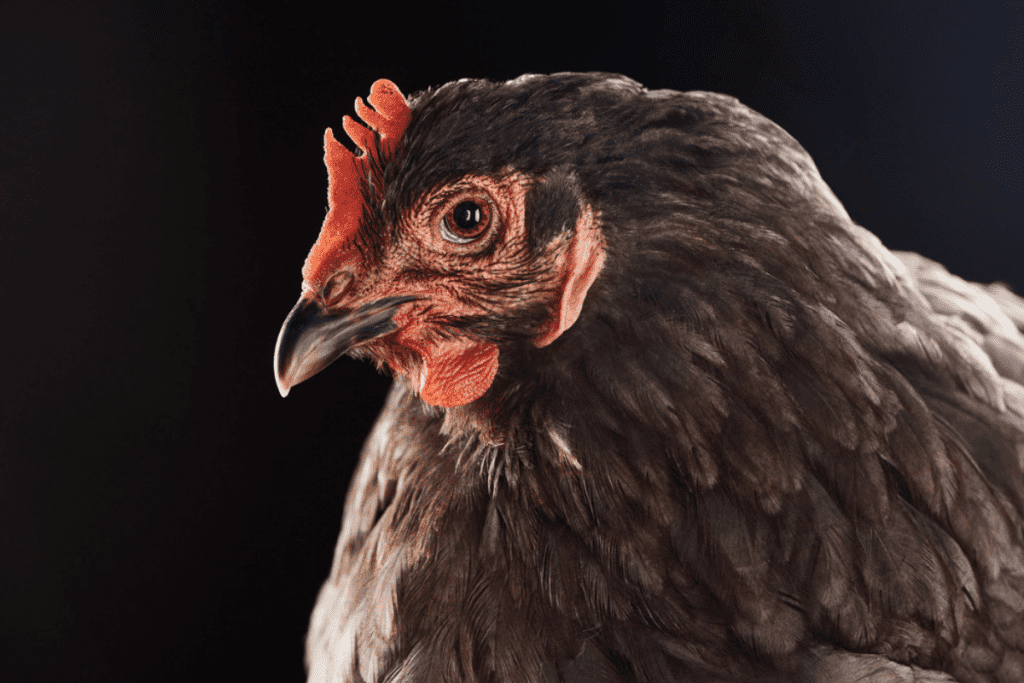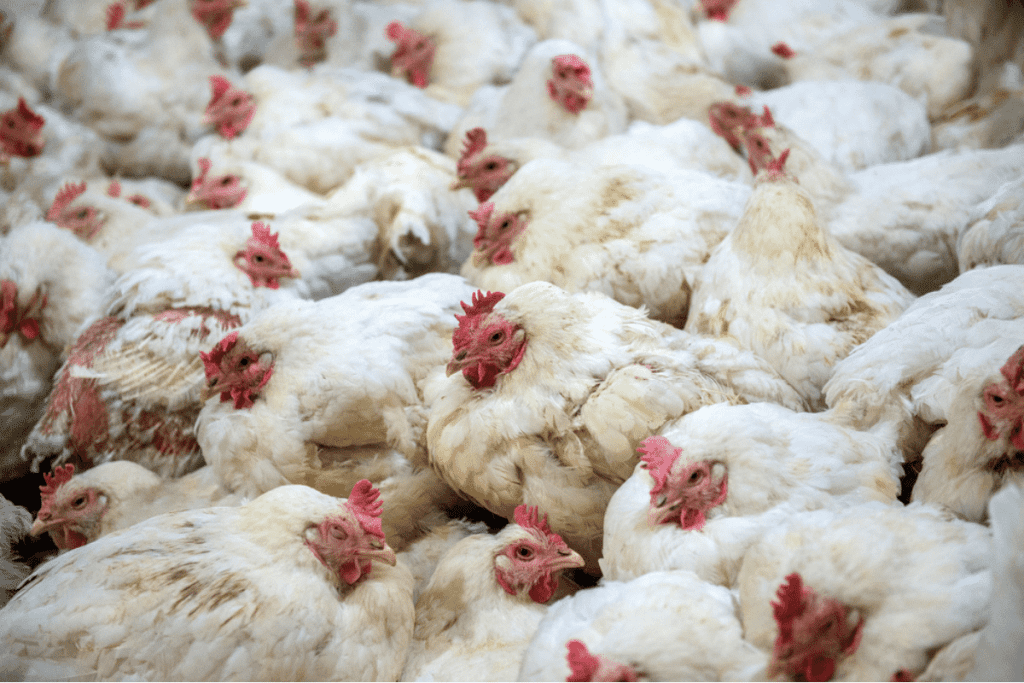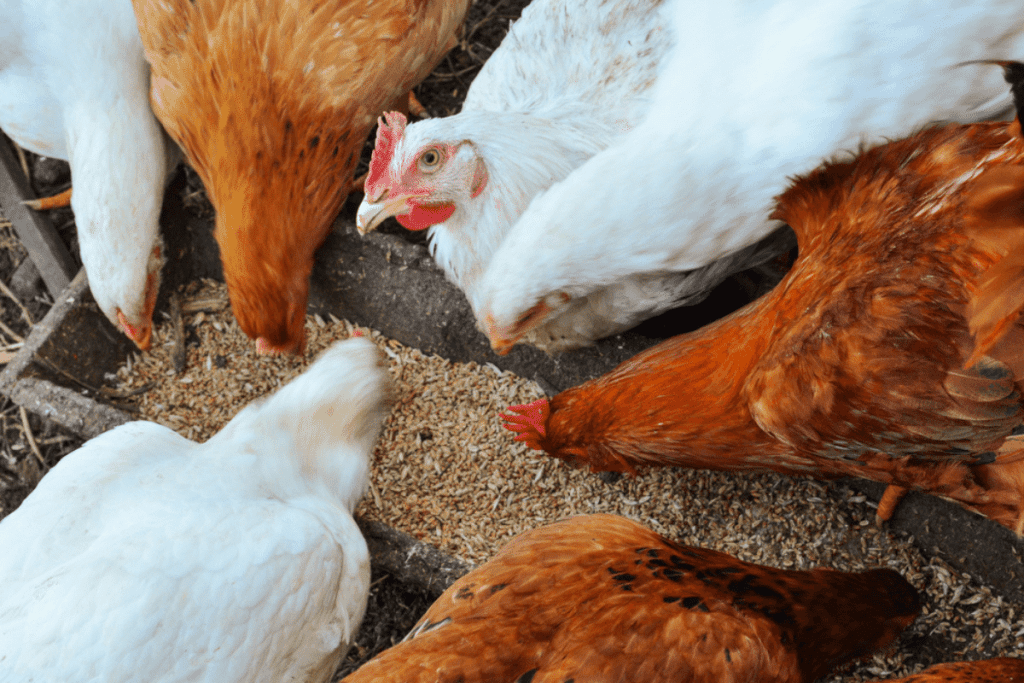It may be unsettling to discover your chickens are losing their feathers, but it does not always indicate a serious problem.
Chickens lose feathers for various reasons, most of which are harmless and reversible.
However, there are a few instances where a loss of feathers is a symptom of an underlying health issue.
Unfortunately, it takes several weeks or months for a chicken’s feathers to grow back completely.
Avoid handling your chickens when their pin feathers are growing back because these areas are very sensitive and may cause pain when they are touched.
In the meantime, you will need to keep your chickens comfortable by providing them with a clean living area, a high-protein diet, and plenty of enrichment activities to keep them comfortable.
It is crucial to figure out what is causing the feather loss in your chickens so you are able to administer the correct treatment.
Keep reading for our list of 15 reasons your chickens are losing feathers so you will be able to recognize any severe problems.

Table of Contents
ToggleMolting
The most common reason for feather loss in chickens is their annual molt.
During molting, chickens lose their old feathers and grow new ones.
Molting is a natural process, and it usually occurs every year in the fall as the egg-laying season winds down.
Baby chicks will go through three molts as they mature, but they are slightly different from the seasonal molts in adults.
Chickens rely on the number of daylight hours to let them know when it is time for molting to begin.
As the days get shorter in the fall, the chickens instinctively begin the molting process.
The average molt lasts about six weeks for most chickens.
Older chickens molt slowly, so the process will take closer to 12-16 weeks for them.
When a chicken begins to molt, it will first lose the feathers around its neck.
Eventually, the chicken will lose feathers on their back and breast feathers.
The tail feathers will be the last to fall out during a molt.
The chicken’s comb may fade until it is no longer a bright red, and egg production in hens will be reduced or stopped completely.
Hens stop laying eggs to use more protein in their diet to grow new feathers.
There is no way to stop a chicken from molting, but adding more protein to its diet will result in a faster molt.
External Parasites
External parasites such as mites, lice, and fleas are another common cause of chickens losing feathers.
A severe parasite infestation may also cause a hen to stop laying eggs.
Further reading: Can chickens get fleas?
These common parasites will suck blood from chickens and deplete them with vital nutrients.
The tiny parasites are also very irritating to a chicken’s skin, and the bird will scratch and pull out feathers to remedy the itchiness.
Lice are easier to see because they live on the chicken’s body, but mites tend to stay in the coop and only come out at night to feed on your birds.
Aside from feather loss, you may notice dirty vent feathers on chickens infested with mites.
Use poultry dust to kill the parasites and prevent them from breeding.
You need to apply the poultry dust directly to your chickens to treat lice.
To get rid of mites, you will need to spread the poultry dust in the chicken coop, paying special attention to nesting areas.
Checking for parasites at the first sign of feather loss is important because treatment will be much easier.
Chickens roll in dirt to prevent bugs and clean themselves.
Learn more in our article at the link.
Bullying
Chickens are known for establishing a pecking order among the flock, and they may attack or bully the weaker birds.
Bullying behavior is more common when new chickens are introduced because the established members need to maintain the pecking order.
Dominant or aggressive chickens will pull the feathers of other chickens and may even cause injuries.
If your chicken is missing feathers and seems to be acting more withdrawn, it is likely due to being bullied.
Examine the bullied chicken for any injuries, especially if you see dried blood on its skin.
If the chicken is injured and is repeatedly being bullied, you may have to separate the bird from the rest of the flock to keep it safe.
Separating your chickens is not ideal as it makes it more difficult to reintroduce the exiled bird back into the flock, but sometimes it must be done.
You may also consider thinning the flock or providing more space for the chickens to curb bullying behaviors.
The Hen is Broody
Occasionally, a hen will become very broody and pull out her own feathers.
The hen uses her feathers to make a warm nest for her eggs.
The feathers are usually pulled from the hen’s breast because these soft and downy feathers provide excellent insulation.
These feathers make it much easier for the hen to regulate the incubation temperature of her eggs.
Once the eggs have hatched, the hen will either start to regrow her feathers or go into a molt.
Fungal Infection

There is a certain fungal infection found in chickens known as vent gleet, and it will cause feather loss.
While the fungus lives in the vent area, the chicken may lose feathers around the vent and other regions of the body.
In addition to feather loss, vent gleet causes a white or yellow discharge to come from the vent.
If your chicken has vent gleet, it is essential to seek veterinary care.
When left untreated, vent gleet will quickly spread to the rest of the flock.
To prevent the fungal infection, keep the coop clean and ensure your birds have constant access to food and fresh, clean water.
Mating
A hen will suffer severe feather loss from mating with an overly-aggressive rooster.
The rooster will pull most of the feathers from a hen’s back and chest if they are mating too frequently.
A rooster may also pull on the hen’s skin, causing further injury.
These abrasions make the hen more susceptible to flystrike when flies lay eggs in these open wounds.
Flystrike is very painful for a hen, and most of the time, the bird will need to be euthanized.
You may need to add or remove chickens for a better hen-to-rooster ratio.
You will have around 10 to 12 hens per rooster as a general rule.
Having more hens lessens the chance of one of them being singled out by the rooster.
A chicken saddle may also cover the bare spot on the hen and prevent other chickens from pecking at her.
Stress
Excess stress is another cause of feather loss in chickens, and it may be due to a variety of factors.
Molting, illness, a new environment, or predators lurking nearby will all raise the stress level of your chickens.
Reduce stress and feather loss in your chickens by providing them with a safe shelter, plenty of food and water, and lots of clean, well-lit space.
Making your chickens feel more secure will reduce their stress and allow their feathers to grow back.
Changes in Diet
Making sudden changes to your chicken’s diet will cause your flock to become stressed and possibly induce a molt.
If your chicken is not receiving enough protein in the diet, it will start to molt and lose feathers.
Feathers consist of 80-85% protein, so adding this nutrient to a high-protein feed will encourage feather growth.
You may also provide additional protein by giving your chickens extra protein snacks.
Any changes in your flock’s diet need to be done gradually to avoid feather loss and other health issues.
Mix three-quarters of the old food with the new food, and gradually increase the ratio of new food to old food over several days.
Excessive Preening
Chickens will frequently take oil from the preen gland at the base of the tail and spread it over their feathers with their beak.
The process is known as preening, and it is how chickens keep themselves groomed.
The oil from preening waterproofs the chicken’s feathers and makes it easier for the body to synthesize vitamin D absorbed by the sun.
While preening, a chicken will usually pull out any broken feathers.
The feather loss from preening is minimal, and you may not even notice until you find a few feathers in the coop.
However, if the bird is highly stressed, it may preen excessively and lose more feathers.
Related: Can a chicken break its tail?
Boredom
If your chickens are not provided with enough space or mental stimulation, they may resort to feather picking.
Vent pecking is the most common form of feather picking among bored chickens in a laying flock.
After a chicken lays an egg, her vent will stay swollen and red for several hours.
This makes the hen susceptible to vent pecking, especially in a bored flock.
To prevent feather pulling or vent pecking due to boredom, provide your flock with several activities to keep them entertained.
The chicken run and coop should have several dust baths, perches, swings, hanging cabbages, and other stimulating activities to keep your flock from getting bored.
Overcrowding

Overcrowding produces results similar to boredom because it causes the chickens to become stressed out and start pulling feathers.
If there is not enough room for the chickens to roam freely, they will peck at each other out of frustration.
Each chicken should have at least 4′ square feet of the coop and run space.
Providing your flock with less room will cause overcrowding and lead to stress.
If you believe your chickens are losing feathers due to overcrowding, you will either need to increase the coop and chicken run size or consider thinning your flock.
Predators
An attack from a predator will pull out clumps of feathers and inflict more severe injuries like cuts and abrasions.
These injuries make the chicken more susceptible to infections and illnesses like flystrike, usually deadly.
It is essential to clean any wounds and keep them bandaged until healed to keep other chickens from pecking at them.
In addition to causing physical harm to at least one of your birds, the rest of the flock may become extremely stressed after the predator attack.
This stress may cause their feathers to fall out, and your chickens will likely be skittish for a while.
You will need to determine how the predator was able to get to your flock and fix the problem as soon as possible.
Keeping your chickens safe and secure is essential in lowering their stress and helping them learn to relax again.
Poor Diet
When chickens are not receiving enough nutrients from their diet, they will begin to lose feathers.
Malnutrition is a very serious problem for chickens, and it makes them prone to developing other health issues.
Some common symptoms of malnutrition include:
- Lethargy
- Loss of appetite
- Weight loss
- Slowed egg production
- Smaller eggs
You may need to switch to a more high-quality feed to provide your chickens with essential nutrients.
Protein is vital in chickens because it aids in egg production and feather regrowth.
It is also best to limit any treats you give to your flock.
The treats likely do not provide all of the nutrients your chickens require, and they may fill up on them and eat less of the more nutritious feed.
Rodents
Rodents are attracted to chicken feed, but they may also go after your chickens.
Rodents will sometimes chew on the chicken feathers to suck the protein out of the feather shaft while the birds are asleep.
The rodents may even pull the feathers out to build their nests.
Signs you may have a rodent problem include feathers with missing ends or jagged edges where they have been chewed.
Thoroughly check the chicken coop for rodent nests and cover any openings with hardware cloth to deter the pests from entering the enclosure.
Make sure the doors to the coop are closed and locked every night for extra protection.
Poor Environment
If your chickens lose feathers because of poor environmental conditions, it will be more challenging to remedy the problem.
The only way to prevent feather loss due to the environment is to think ahead of time and provide your flock with anything they need.
If the chickens are too hot, provide them with extra shade or install a fan in the coop for better air circulation.
When chickens lose feathers because they are cold, give them a safe heat source.
Chickens will also lose feathers if they do not drink enough water.
It is crucial to provide fresh, clean water for your chickens since they will not drink dirty water.
Related: Will chickens eat snow for water?
Other environmental factors which will cause feather loss include overcrowding and bright lights.
Give your chickens plenty of space, and be sure you turn the lights off at night to avoid interfering with the bird’s circadian rhythm.
When your chickens are comfortable, they will stop losing feathers.
How useful was this post?
Click on a star to rate it!
We are sorry that this post was not useful for you!
Let us improve this post!
Tell us how we can improve this post?
